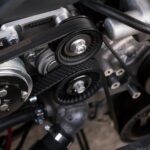Jeep engines are designed to be reliable and withstand the rigors of off-roading, however they are still prone to wear and tear from regular use. As such, it’s important for Jeep owners to understand how to diagnose and fix common engine issues. This article will provide an overview of the most common Jeep engine issues, as well as tips on how to diagnose and fix them.
Common Issues with Jeep Engines
There are a number of different issues that can arise with Jeep engines, but some of the most common include:
Improved Gas Mileage – If you’re noticing your Jeep is not getting as good gas mileage as before, it’s likely due to clogged fuel injectors or worn spark plugs/wires. You can try cleaning or replacing these parts as a first step in troubleshooting the issue.
Rough Idle – A rough idle can indicate any number of problems with your Jeep’s engine such as an air intake leak, a vacuum leak or faulty oxygen sensor(s). Start by checking for any external leaks in the air intake system or vacuum lines and if none are found then testing your oxygen sensors is recommended.

Low Oil Pressure – Low oil pressure can be caused by an issue with the oil pump, worn internal engine parts or low oil levels. If you’ve recently changed the engine’s oil and filter, it could be a sign of worn out internal components. Check your engine’s oil level to ensure it is at the proper level and if it is then you may need to replace some of your engine’s components.
Overheating – An overheating Jeep can be caused by a number of things such as a stuck thermostat, degraded coolant hoses or poor circulation of coolant through your radiator. If you find that there is no coolant flow then check for any blockages in the radiator as this could indicate an obstruction in the cooling system.
Hard Starting – Hard starting can also indicate several different issues including a weak battery, faulty spark plugs or fuel injectors or poor fuel delivery from the fuel pump. Start by checking your battery for any signs of damage and replacing any faulty spark plugs/wires or fuel injectors that may be causing the issue.
How to Properly Diagnose Your Engine Issue
Check The Basics First – Before troubles hooting any engine issue it’s important to check the basic components such as spark plugs, wires, and fuel injectors. Check for any signs of wear and tear or damage on these parts which could be causing the issue.
Check Parts for Wear and Tear – Check for any worn out internal engine parts such as pistons, gaskets or seals as these can cause performance issues. If you find that any of these components are worn out then they must be replaced in order to fix the issue.
Check For External Leaks And Obstructions – Look around your engine bay for any external leaks or obstructions that could be causing an issue with your Jeep’s performance. If you find a leak then it should be fixed immediately in order to prevent further damage to your engine.
Appropriate Testing For Your Specific Issue – Depending on the specific issue that you are having with your Jeep, you may need to do some additional testing or diagnosis in order to properly diagnose and fix the problem. This could include compression testing, cylinder head pressure testing or a computer diagnostic scan of your vehicle’s onboard computer system depending on what specific problem you are facing with your engine. Also read about 3.7 jeep firing order.
How to Fix Your Engine Issue Once You’ve Diagnosed It
Once you have properly diagnosed the issue with your Jeep’s engine, it is time to take action to fix the problem. Depending on the issue that you are facing, this could include anything from replacing faulty spark plugs/wires or fuel injectors to replacing worn out internal engine components or fixing external leaks and obstructions. If you don’t feel comfortable performing any of these repairs yourself then it’s best to seek professional advice from a qualified mechanic.
Conclusion
Maintaining and taking care of your Jeep’s engine is essential for its longevity and performance over time. By understanding how to diagnose and fix common Jeep engine issues, you can help ensure your vehicle runs smoothly for years to come. With proper maintenance and care, your Jeep should be able to withstand any potential wear and tear that comes with regular use.











